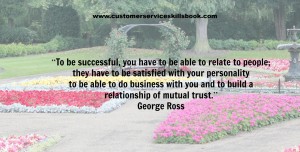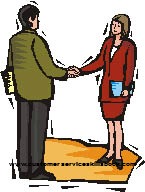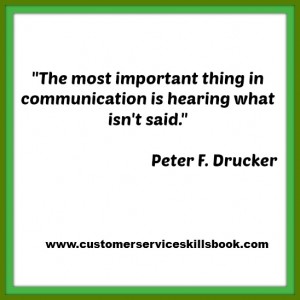Nonverbal Customer Communication Strategies
As a customer service professional, it is impossible for you to “not” send nonverbal messages to your customers. They are evaluating you based on your posture, facial expressions, height, body type and condition, skin color, complexion, clothing, jewelry, and many other nonverbal cues. Your goal should be to eliminate communication barriers and to pay attention to all these factors. You should also strive to communicate a message of professionalism and that you are alert, happy, capable and ready to serve your customer.

On the telephone, your tone and attitude should project a positive, upbeat and professional presence that helps encourage people to continue to do business with you and your organization.
When speaking with a customer face-to-face, you should avoid negative body cues and facial gestures like frowning, crossing arms across the chest, using eye contact inappropriately as your customer speaks, pointing fingers at someone, rubbing the back of your neck or the bridge of your nose, or any other movement that might indicate boredom, stress, frustration or displeasure since some cultures view these things negatively. Also, you should be conscious of nervous habits that you might have which could say to the customer that you are impatient, uncertain, or otherwise not confident about a given situation (e.g. a sale). For example, fidgeting, jingling change or playing with items in your pocket, twirling the ends of your hair, clicking a ballpoint pen, biting nails, looking at your watch, or rubbing your hands together.
When interacting with your customers, it is important that you monitor your own nonverbal cues and those that they use. In doing so, remember that just because someone from a culture uses a nonverbal cue similar to one that your culture uses does not mean that it has the same meaning with which you are familiar. Learning to appropriately interpret and appreciate different nonverbal cues used by customers from around the world will give you a big advantage over your competition when dealing with people from various cultural and diverse backgrounds.
An important thing to remember is that you should not assign meaning to a nonverbal cue that you see a customer use out of context (e.g. their verbal and nonverbal messages do not seem to match). This is because the same gesture (e.g. a smile) might have different meanings when used by someone based on the situation, their level of emotion, the environment, a person that they are with, time, the customer’s cultural background and your personal frame of reference related to the signal.
To better discover ways to communicate positively in a global business environment, get a copy of Please Every Customer: Delivering stellar customer service across cultures.
About Robert C. Lucas
Bob Lucas has been a trainer, presenter, customer service expert, and adult educator for over four decades. He has written hundreds of articles on training, writing, self-publishing, and workplace learning skills and issues. He is also an award-winning author who has written thirty-seven books on topics such as, writing, relationships, customer service, brain-based learning, and creative training strategies, interpersonal communication, diversity, and supervisory skills. Additionally, he has contributed articles, chapters, and activities to eighteen compilation books. Bob retired from the U.S. Marine Corps in 1991 after twenty-two years of active and reserve service.
Make Money Writing Books: Proven Profit Making Strategies for Authors by Robert W. Lucas at Amazon.com.
The key to successfully making money as an author and/or self-publisher is to brand yourself and your company and to make yourself and your book(s) a household name. Part of this is face-to-face interaction with people at trade shows, library events, book readings, book store signings, blogging or guest blogging on a topic related to their book(s). Another strategy involves writing articles and other materials that show up online and are found when people search for a given topic related to a topic about which the author has written.
If you need help building an author platform, branding yourself and your book(s) or generating recognition for what you do, Make Money Writing Books will help. Bob’s popular book addresses a multitude of ideas and strategies that you can use to help sell more books and create residual and passive income streams. The tips outlined in the book are focused to help authors but apply to virtually any professional trying to increase personal and product recognition and visibility.









